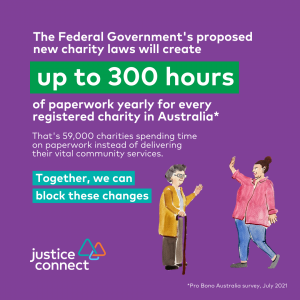New laws to deter unlawful activity will create up to 300 hours of paperwork for registered charities
29 Jul 2021
A recent survey of the charity sector conducted by Pro Bono Australia has revealed that the Federal Government’s proposed changes to Australian Charities and Not-for-Profit Commission (ACNC) Governance Standard 3 is estimated to create between 50 – 300 hours of paperwork for every registered charity.
The proposed changes – which could see charities deregistered for committing minor breaches of the law – are creating confusion and fear in the sector, with 75% of survey respondents stating that they will stop making their views known publicly to avoid potentially breaching the new law.
As experts in Not-for-Profit Law, we know that the law is already complicated enough for charities, and that it is especially hard for small charities, which make up 65% of the sector. This is why we have consistently opposed these changes for 3 main reasons:
- The changes are unnecessary and unsupported by the ACNC’s own data
- The administrative burden, especially on volunteer charity Boards, is unjustified
- The restrictions will discourage charities from advocating for change and participating in our democracy.
People and organisations across the political spectrum agree with our alliance of over 60 charities, which include World Vision and St Vincent de Paul. Liberal Senator Concetta Fierravanti-Wells recently voiced serious concerns about the regulation on behalf of the Senate Standing Committee for the Scrutiny of Delegated Legislation.
What are the proposed changes?
Charities must comply with the law just like any other person or business. Currently, under ACNC Governance Standard 3, an organisation may lose its charity status if it commits a serious indictable offence. The Federal Government proposes to extend this to include a wider range of less serious summary offences relating to trespassing, unlawful entry, malicious damage or vandalism.
Under the new regulation, the ACNC Commissioner would have the power to take action against a charity (including deregistration) if the Commissioner ‘reasonably’ believes that the charity:
- has engaged in conduct which may be considered a relevant summary offence (even if the charity hasn’t been charged or convicted), or
- is likely to commit a relevant summary offence, or
- has failed to maintain ‘reasonable internal control procedures’ to ensure that its resources (including its staff, funds and social media accounts) aren’t used by another person to commit a relevant indictable or summary offence, or
- has not kept adequate records to prove the steps it has taken to comply with the law.
What kind of conduct could be caught?
These new laws have the potential to capture a broad range of unintentional and inadvertent activities by charities. For example, a charity could breach the new Governance Standard if it:
- used their organisational social media accounts to promote a vigil where people are peacefully blocking the entrance to a business
- printed posters in support of a campaign to protect the environment, which a staff member or volunteer later stuck to stop signs and light poles, or
- provided a room to a community group not knowing that the group was using to plan a sit-in in a Minister’s office.
The regulation is unnecessary
The Federal Government says the new regulation is necessary to stop ‘unlawful behaviours promoted and engaged in by activist organisations masquerading as charities’.
However, a review of the ACNC legislation conducted by a specially appointed panel in 2018 didn’t identify any issues with unlawful behaviour by charities, instead recommending the removal of this Governance Standard.
And, as recently as June this year, the ACNC Commissioner stated in Senate Estimates that there’s no widespread problem of unlawful activity by activist charities. In the last 3 1/2 years, only 2 charities lost their charity status because of unlawful activity. But the fact that 2 have been deregistered shows the Commissioner already has sufficient power and will use it where he believes it is necessary.
The regulation poses an unjustified administrative burden on charities
It’s unfair that 59,000 registered charities – 65% of which are small charities – should have to spend their increasingly limited resources complying with unwarranted changes to the law.
The new regulation is broad and uncertain in scope: it doesn’t set out the full range of Federal, State and Territory summary offences that are prohibited, or give any concrete guidance about what kinds of internal control procedures will be deemed ‘reasonable’. Pro Bono Australia’s survey has confirmed that there is significant confusion in the sector, with 86% of respondents aware of the changes but 60% unsure about how the changes would actually affect their charity.
The Federal Government estimates it will take each charity only 2 hours to comply with the changes. Respondents to Pro Bono Australia’s survey resoundingly disagree:
“A combined total of 40 per cent of charities estimated the new regulations would add more than 50 hours to their organisation’s workload over the coming year – 17 per cent said it would be between 51 and 100, 14 per cent put it between 100 and 300 hours, and 9 per cent estimated it would add more than 300 hours of work.”
We know that the burden for all volunteer Boards will be significant, not just for ‘activist charities’. At a minimum, they will be required to:
- understand the nature of the changes,
- research the relevant indictable and summary offences that could apply,
- assess the risk for their organisation,
- obtain legal advice,
- develop ‘reasonable internal control procedures’ to control the use of their resources, and
- implement and monitor those new procedures.
The regulation will discourage charities from advocating for change and stifle democratic debate
We’re concerned charities will avoid lawful and peaceful protest activities for fear of unintentionally breaching these new laws. Fulfilling their charitable purposes, their mission to end domestic violence for example, can involve public marches and events to build awareness and momentum for change.
How can you help? It’s easy:
The Federal Government needs to hear from the charities that these changes will impact the most. That’s where you come in.
Can you share the below social media graphic to help us amplify our message?



